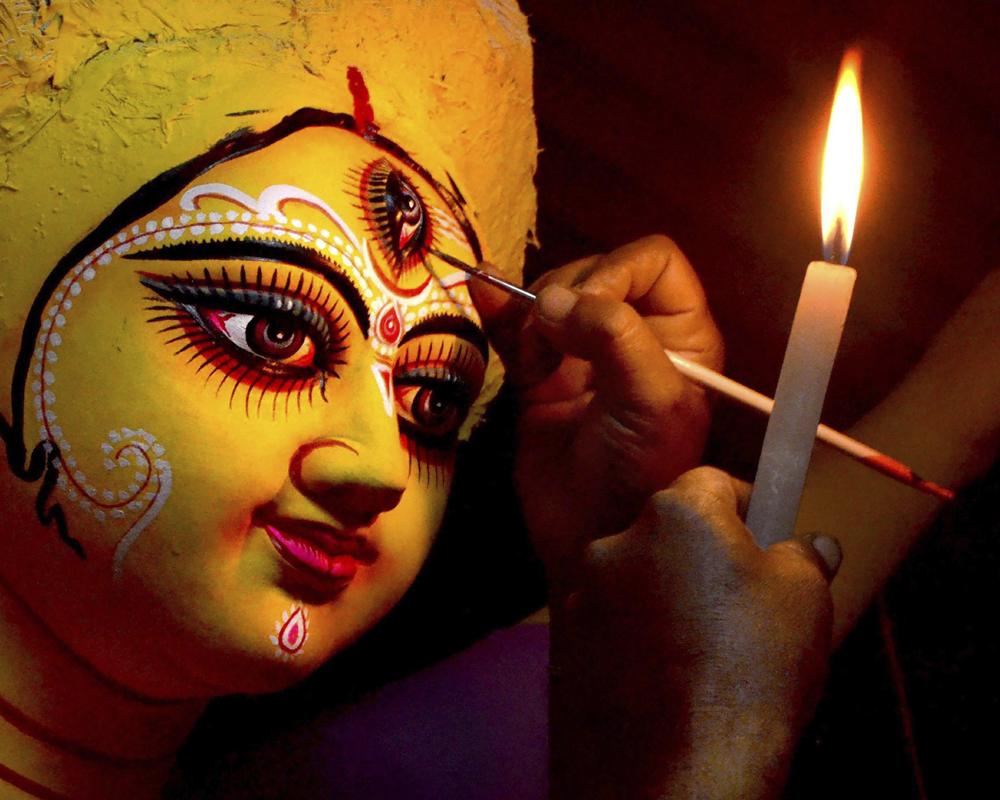Mahalaya marks the sacred transition from Pitru Paksha to Devi Paksha, blending ancestral reverence with divine celebration. As chants of Mahishasuramardini echo at dawn, it heralds the Goddess's descent to Earth and the spiritual beginning of Durga Puja.
As the first light of dawn breaks on Mahalaya, countless households across Bengal and beyond come alive with the resonant strains of Mahishasuramardini—a powerful blend of mantras and narration broadcast since 1931. The crackling radio, the sacred verses, and the early morning rituals mark Mahalaya not merely as a date but as an emotion, a spiritual threshold where remembrance of the departed meets anticipation of the divine. It is the juncture between Pitru Paksha, the fortnight for ancestral homage, and Devi Paksha, when the worship of Goddess Durga formally begins.
Traditionally, Mahalaya signifies the end of Pitru Paksha, a time when families offer tarpan—rituals involving water and prayer—for the peace of their ancestors’ souls. For those unable to perform shraddha on the death anniversary of a departed loved one, this day holds special significance. According to scriptures, offering water and prayers during this time brings blessings, removes household obstacles, and ensures prosperity and peace. The sanctity of Mahalaya lies in its ability to bridge generations—honoring the past while welcoming the divine present.
advertisement


Scripturally, it is believed that on Mahalaya, Goddess Durga receives her divine command to destroy the demon Mahishasura. From the very next day, Pratipada, begins the Devi Paksha—ushering in the celebrations of Durga Puja. This divine descent marks the triumph of good over evil and serves as a spiritual awakening across communities.
According to the Vishuddha Siddhanta Panjika, this year’s Mahalaya falls on Sunday, 21st September, which is the 4th day of the Bengali month Ashwin. The Amavasya Tithi begins at 12:18 AM on 20th September (Saturday) and ends at 1:24 AM on 21st September (Sunday). Observances include fasting, Mahalaya shraddha, and the Amavasya Puja of Goddess Sharadiya Durga.
advertisement


As per the Gupta Press Panjika, Amavasya Tithi begins slightly earlier, at 11:53:25 PM on 20th September (Saturday), and ends at 12:23:46 AM on 21st September (Sunday). Similar observances are followed—fasting, rituals for the ancestors, and Mahalaya shraddha. Despite these minor differences in calculation, the spiritual essence remains the same: a time of deep reflection, reverence, and readiness to welcome the Goddess into our lives and homes.
 Scripturally, it is believed that on Mahalaya, Goddess Durga receives her divine command to destroy the demon Mahishasura. From the very next day, Pratipada, begins the Devi Paksha—ushering in the celebrations of Durga Puja. This divine descent marks the triumph of good over evil and serves as a spiritual awakening across communities.
Scripturally, it is believed that on Mahalaya, Goddess Durga receives her divine command to destroy the demon Mahishasura. From the very next day, Pratipada, begins the Devi Paksha—ushering in the celebrations of Durga Puja. This divine descent marks the triumph of good over evil and serves as a spiritual awakening across communities.




